Tourism and Environmental Concerns in Developing World Report
VerifiedAdded on 2023/06/08
|13
|3018
|328
Report
AI Summary
This report delves into the contentious issue of tourism sustainability in the developing world, arguing against the notion that it is inherently unsustainable due to environmental concerns. It explores the multifaceted nature of the tourism industry, encompassing economic, social, and environmental dimensions. The report highlights the benefits of tourism, such as its contribution to environmental reserves and conservation efforts, while also acknowledging the potential for negative impacts. It examines the relationship between tourism and the environment, emphasizing the interdependence between the two. Furthermore, the report discusses the concept of sustainable tourism, referencing examples like Bio-Hotel in Colombia, and provides recommendations for effective management practices. These recommendations include sustainable use of resources, integration of tourism into local development strategies, and fostering stakeholder education. The report concludes by emphasizing tourism's potential to contribute to economic growth and poverty reduction, particularly in developing countries, when managed responsibly.
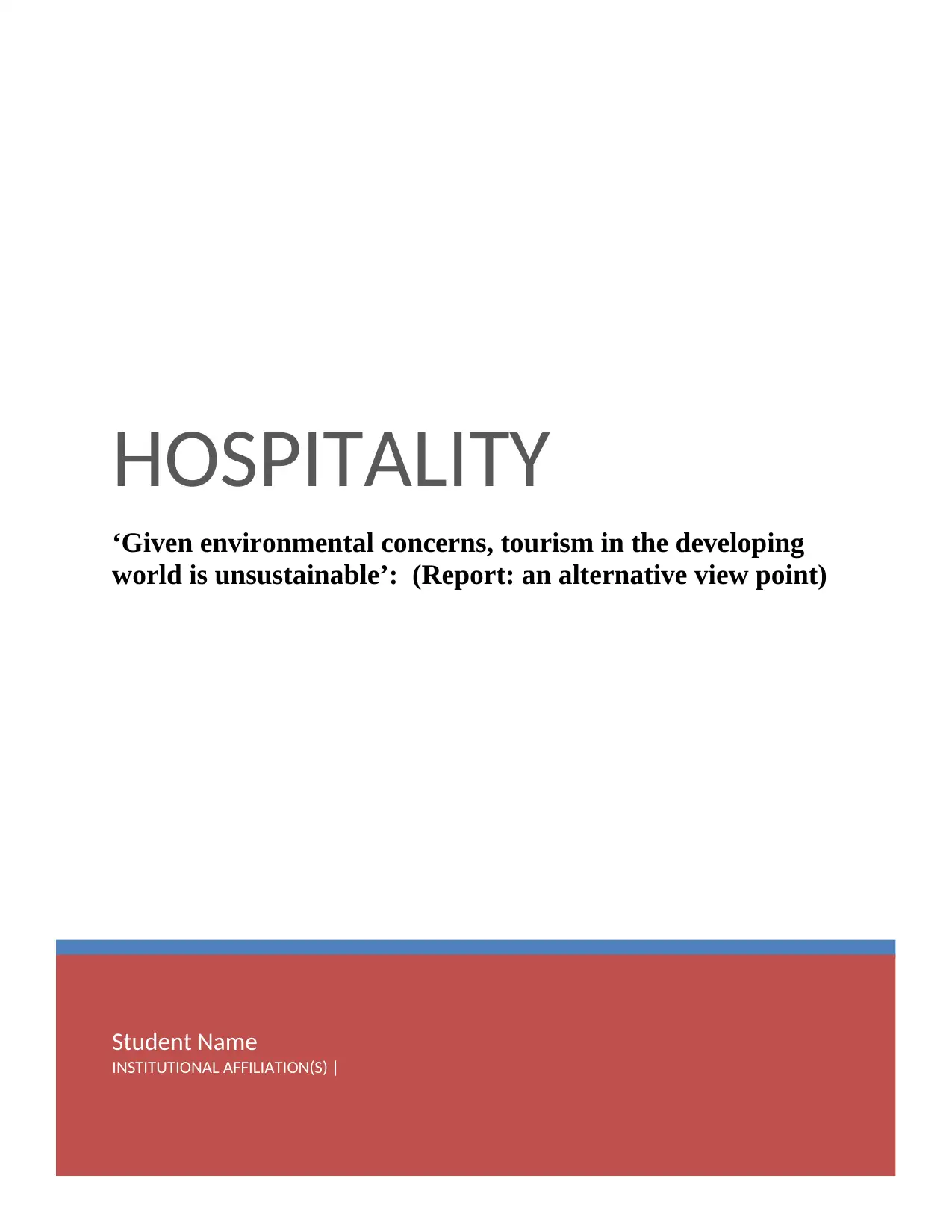
Student Name
INSTITUTIONAL AFFILIATION(S) |
HOSPITALITY
‘Given environmental concerns, tourism in the developing
world is unsustainable’: (Report: an alternative view point)
INSTITUTIONAL AFFILIATION(S) |
HOSPITALITY
‘Given environmental concerns, tourism in the developing
world is unsustainable’: (Report: an alternative view point)
Paraphrase This Document
Need a fresh take? Get an instant paraphrase of this document with our AI Paraphraser
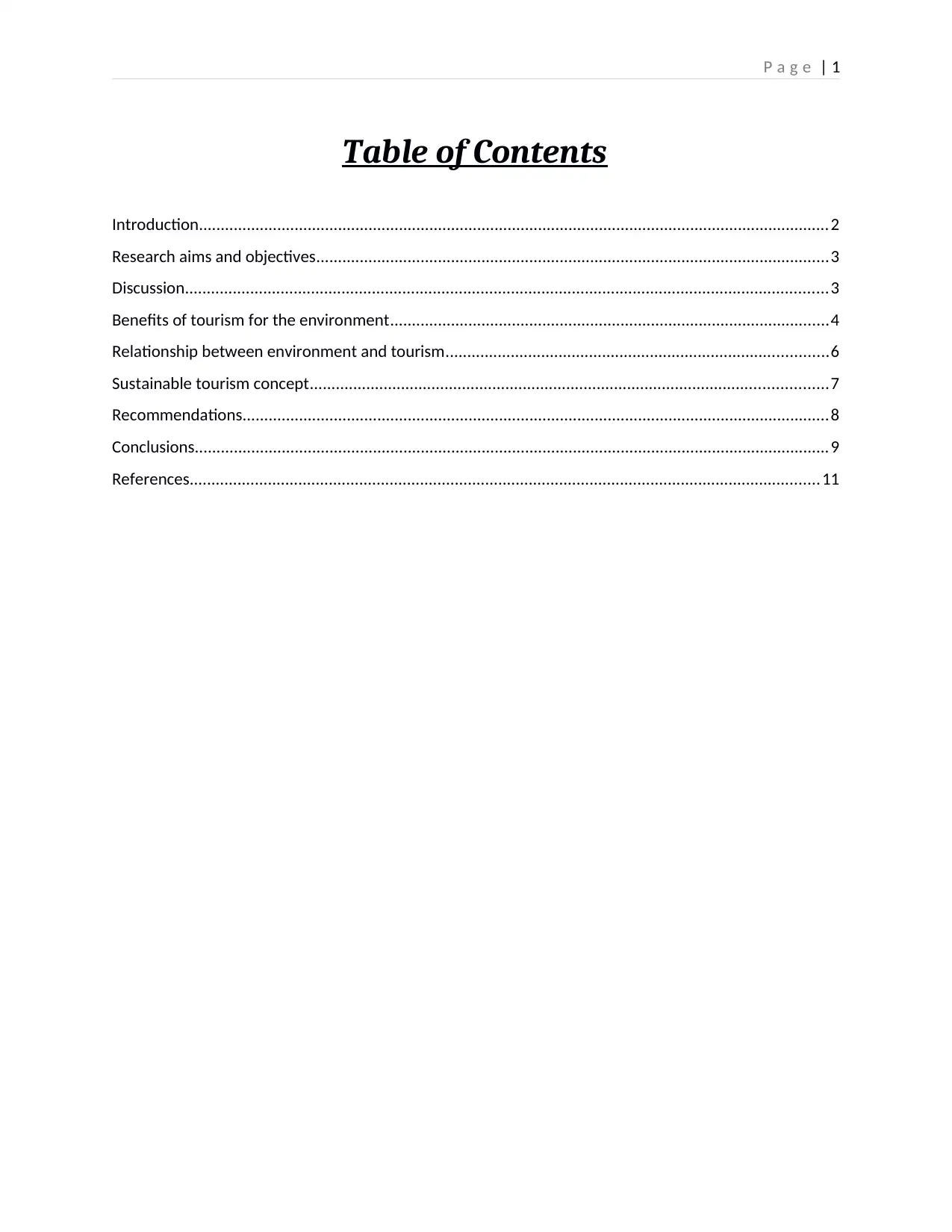
P a g e | 1
Table of Contents
Introduction.................................................................................................................................................2
Research aims and objectives......................................................................................................................3
Discussion....................................................................................................................................................3
Benefits of tourism for the environment.....................................................................................................4
Relationship between environment and tourism........................................................................................6
Sustainable tourism concept.......................................................................................................................7
Recommendations.......................................................................................................................................8
Conclusions..................................................................................................................................................9
References.................................................................................................................................................11
Table of Contents
Introduction.................................................................................................................................................2
Research aims and objectives......................................................................................................................3
Discussion....................................................................................................................................................3
Benefits of tourism for the environment.....................................................................................................4
Relationship between environment and tourism........................................................................................6
Sustainable tourism concept.......................................................................................................................7
Recommendations.......................................................................................................................................8
Conclusions..................................................................................................................................................9
References.................................................................................................................................................11
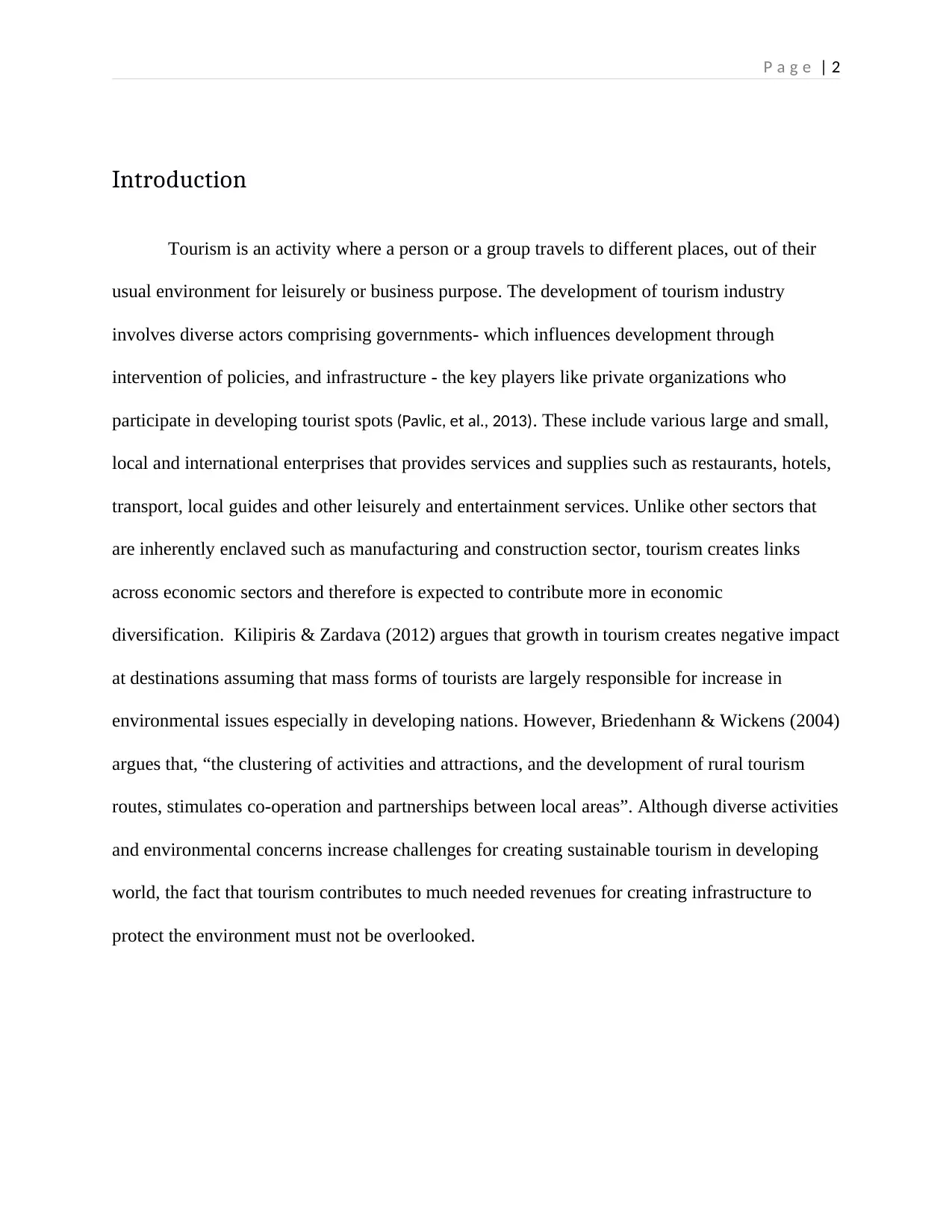
P a g e | 2
Introduction
Tourism is an activity where a person or a group travels to different places, out of their
usual environment for leisurely or business purpose. The development of tourism industry
involves diverse actors comprising governments- which influences development through
intervention of policies, and infrastructure - the key players like private organizations who
participate in developing tourist spots (Pavlic, et al., 2013). These include various large and small,
local and international enterprises that provides services and supplies such as restaurants, hotels,
transport, local guides and other leisurely and entertainment services. Unlike other sectors that
are inherently enclaved such as manufacturing and construction sector, tourism creates links
across economic sectors and therefore is expected to contribute more in economic
diversification. Kilipiris & Zardava (2012) argues that growth in tourism creates negative impact
at destinations assuming that mass forms of tourists are largely responsible for increase in
environmental issues especially in developing nations. However, Briedenhann & Wickens (2004)
argues that, “the clustering of activities and attractions, and the development of rural tourism
routes, stimulates co-operation and partnerships between local areas”. Although diverse activities
and environmental concerns increase challenges for creating sustainable tourism in developing
world, the fact that tourism contributes to much needed revenues for creating infrastructure to
protect the environment must not be overlooked.
Introduction
Tourism is an activity where a person or a group travels to different places, out of their
usual environment for leisurely or business purpose. The development of tourism industry
involves diverse actors comprising governments- which influences development through
intervention of policies, and infrastructure - the key players like private organizations who
participate in developing tourist spots (Pavlic, et al., 2013). These include various large and small,
local and international enterprises that provides services and supplies such as restaurants, hotels,
transport, local guides and other leisurely and entertainment services. Unlike other sectors that
are inherently enclaved such as manufacturing and construction sector, tourism creates links
across economic sectors and therefore is expected to contribute more in economic
diversification. Kilipiris & Zardava (2012) argues that growth in tourism creates negative impact
at destinations assuming that mass forms of tourists are largely responsible for increase in
environmental issues especially in developing nations. However, Briedenhann & Wickens (2004)
argues that, “the clustering of activities and attractions, and the development of rural tourism
routes, stimulates co-operation and partnerships between local areas”. Although diverse activities
and environmental concerns increase challenges for creating sustainable tourism in developing
world, the fact that tourism contributes to much needed revenues for creating infrastructure to
protect the environment must not be overlooked.
⊘ This is a preview!⊘
Do you want full access?
Subscribe today to unlock all pages.

Trusted by 1+ million students worldwide
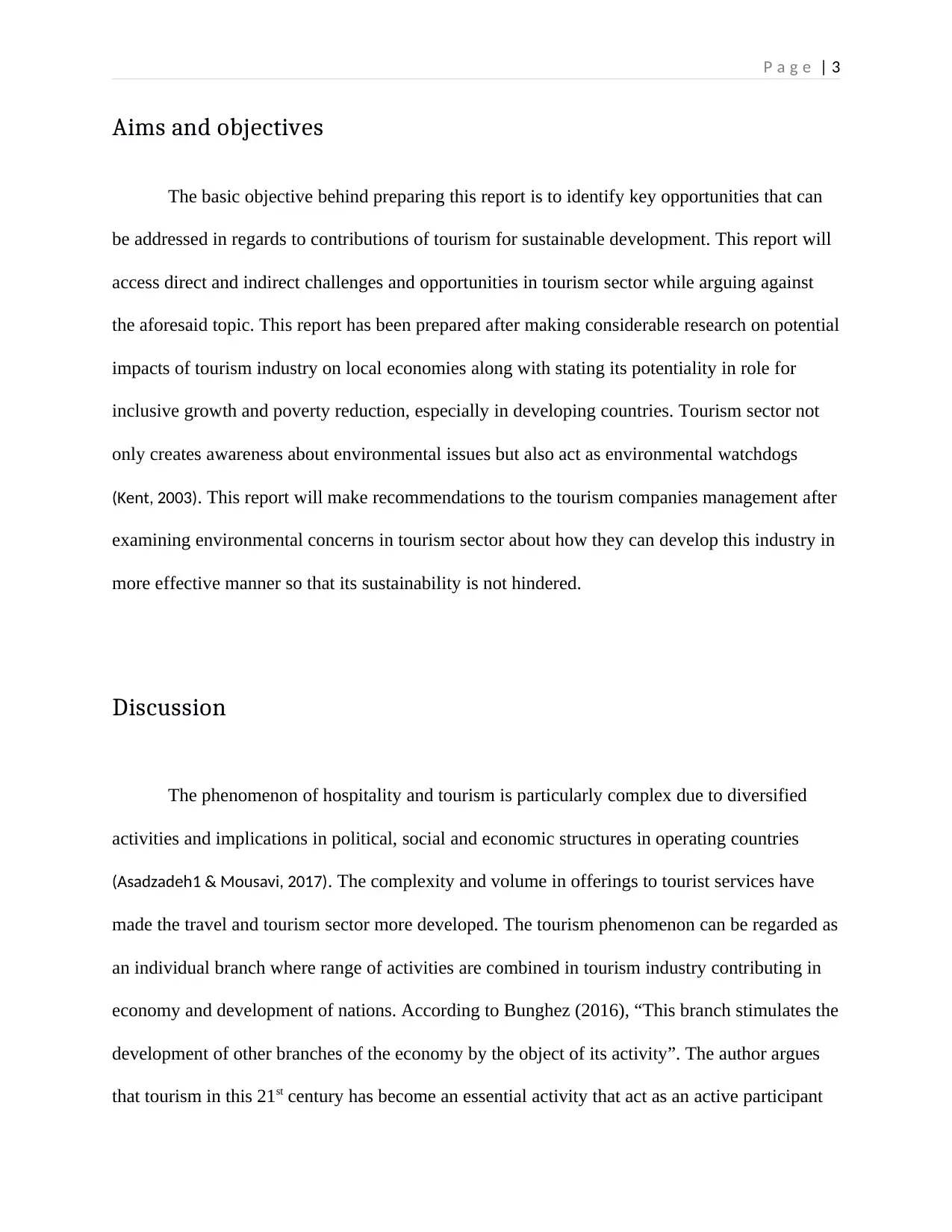
P a g e | 3
Aims and objectives
The basic objective behind preparing this report is to identify key opportunities that can
be addressed in regards to contributions of tourism for sustainable development. This report will
access direct and indirect challenges and opportunities in tourism sector while arguing against
the aforesaid topic. This report has been prepared after making considerable research on potential
impacts of tourism industry on local economies along with stating its potentiality in role for
inclusive growth and poverty reduction, especially in developing countries. Tourism sector not
only creates awareness about environmental issues but also act as environmental watchdogs
(Kent, 2003). This report will make recommendations to the tourism companies management after
examining environmental concerns in tourism sector about how they can develop this industry in
more effective manner so that its sustainability is not hindered.
Discussion
The phenomenon of hospitality and tourism is particularly complex due to diversified
activities and implications in political, social and economic structures in operating countries
(Asadzadeh1 & Mousavi, 2017). The complexity and volume in offerings to tourist services have
made the travel and tourism sector more developed. The tourism phenomenon can be regarded as
an individual branch where range of activities are combined in tourism industry contributing in
economy and development of nations. According to Bunghez (2016), “This branch stimulates the
development of other branches of the economy by the object of its activity”. The author argues
that tourism in this 21st century has become an essential activity that act as an active participant
Aims and objectives
The basic objective behind preparing this report is to identify key opportunities that can
be addressed in regards to contributions of tourism for sustainable development. This report will
access direct and indirect challenges and opportunities in tourism sector while arguing against
the aforesaid topic. This report has been prepared after making considerable research on potential
impacts of tourism industry on local economies along with stating its potentiality in role for
inclusive growth and poverty reduction, especially in developing countries. Tourism sector not
only creates awareness about environmental issues but also act as environmental watchdogs
(Kent, 2003). This report will make recommendations to the tourism companies management after
examining environmental concerns in tourism sector about how they can develop this industry in
more effective manner so that its sustainability is not hindered.
Discussion
The phenomenon of hospitality and tourism is particularly complex due to diversified
activities and implications in political, social and economic structures in operating countries
(Asadzadeh1 & Mousavi, 2017). The complexity and volume in offerings to tourist services have
made the travel and tourism sector more developed. The tourism phenomenon can be regarded as
an individual branch where range of activities are combined in tourism industry contributing in
economy and development of nations. According to Bunghez (2016), “This branch stimulates the
development of other branches of the economy by the object of its activity”. The author argues
that tourism in this 21st century has become an essential activity that act as an active participant
Paraphrase This Document
Need a fresh take? Get an instant paraphrase of this document with our AI Paraphraser
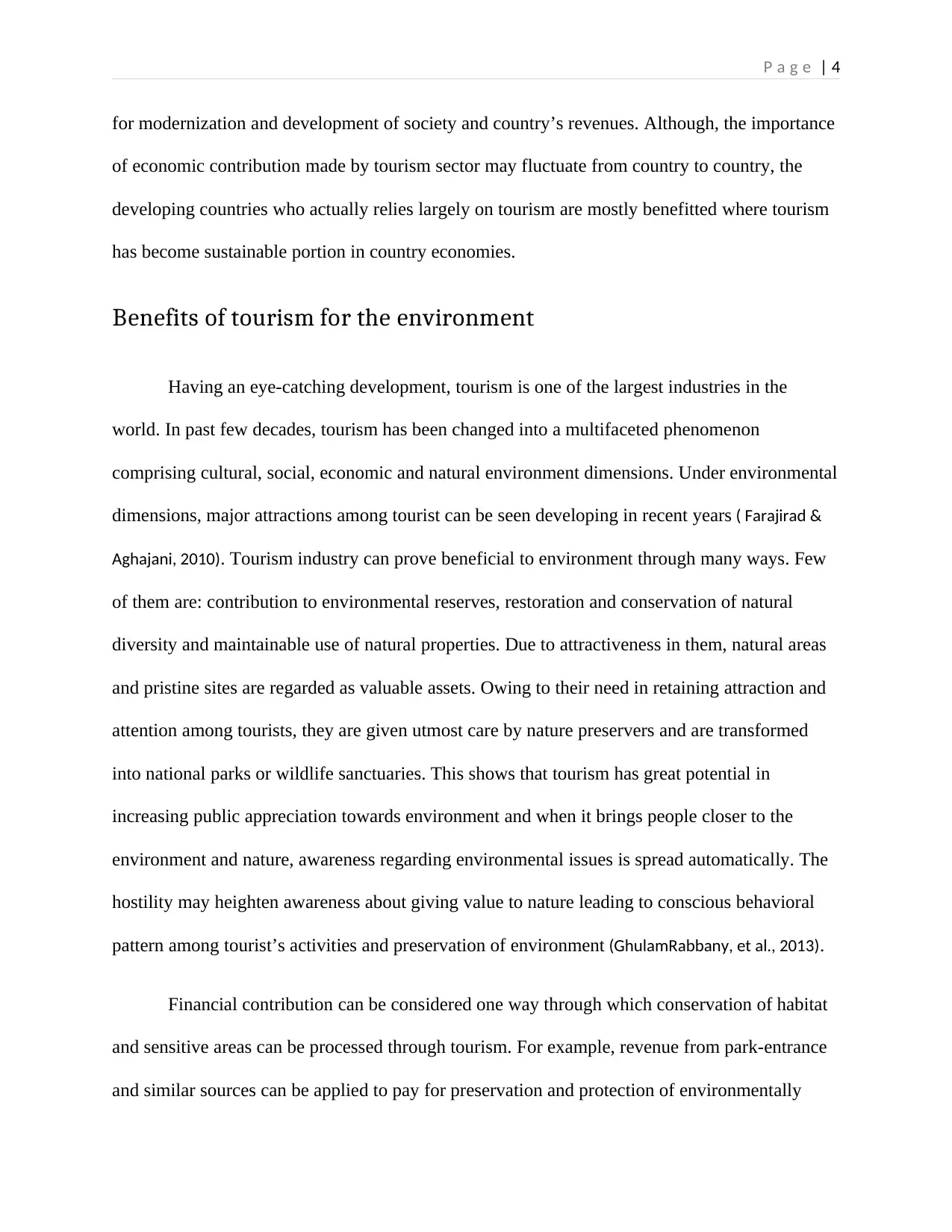
P a g e | 4
for modernization and development of society and country’s revenues. Although, the importance
of economic contribution made by tourism sector may fluctuate from country to country, the
developing countries who actually relies largely on tourism are mostly benefitted where tourism
has become sustainable portion in country economies.
Benefits of tourism for the environment
Having an eye-catching development, tourism is one of the largest industries in the
world. In past few decades, tourism has been changed into a multifaceted phenomenon
comprising cultural, social, economic and natural environment dimensions. Under environmental
dimensions, major attractions among tourist can be seen developing in recent years ( Farajirad &
Aghajani, 2010). Tourism industry can prove beneficial to environment through many ways. Few
of them are: contribution to environmental reserves, restoration and conservation of natural
diversity and maintainable use of natural properties. Due to attractiveness in them, natural areas
and pristine sites are regarded as valuable assets. Owing to their need in retaining attraction and
attention among tourists, they are given utmost care by nature preservers and are transformed
into national parks or wildlife sanctuaries. This shows that tourism has great potential in
increasing public appreciation towards environment and when it brings people closer to the
environment and nature, awareness regarding environmental issues is spread automatically. The
hostility may heighten awareness about giving value to nature leading to conscious behavioral
pattern among tourist’s activities and preservation of environment (GhulamRabbany, et al., 2013).
Financial contribution can be considered one way through which conservation of habitat
and sensitive areas can be processed through tourism. For example, revenue from park-entrance
and similar sources can be applied to pay for preservation and protection of environmentally
for modernization and development of society and country’s revenues. Although, the importance
of economic contribution made by tourism sector may fluctuate from country to country, the
developing countries who actually relies largely on tourism are mostly benefitted where tourism
has become sustainable portion in country economies.
Benefits of tourism for the environment
Having an eye-catching development, tourism is one of the largest industries in the
world. In past few decades, tourism has been changed into a multifaceted phenomenon
comprising cultural, social, economic and natural environment dimensions. Under environmental
dimensions, major attractions among tourist can be seen developing in recent years ( Farajirad &
Aghajani, 2010). Tourism industry can prove beneficial to environment through many ways. Few
of them are: contribution to environmental reserves, restoration and conservation of natural
diversity and maintainable use of natural properties. Due to attractiveness in them, natural areas
and pristine sites are regarded as valuable assets. Owing to their need in retaining attraction and
attention among tourists, they are given utmost care by nature preservers and are transformed
into national parks or wildlife sanctuaries. This shows that tourism has great potential in
increasing public appreciation towards environment and when it brings people closer to the
environment and nature, awareness regarding environmental issues is spread automatically. The
hostility may heighten awareness about giving value to nature leading to conscious behavioral
pattern among tourist’s activities and preservation of environment (GhulamRabbany, et al., 2013).
Financial contribution can be considered one way through which conservation of habitat
and sensitive areas can be processed through tourism. For example, revenue from park-entrance
and similar sources can be applied to pay for preservation and protection of environmentally
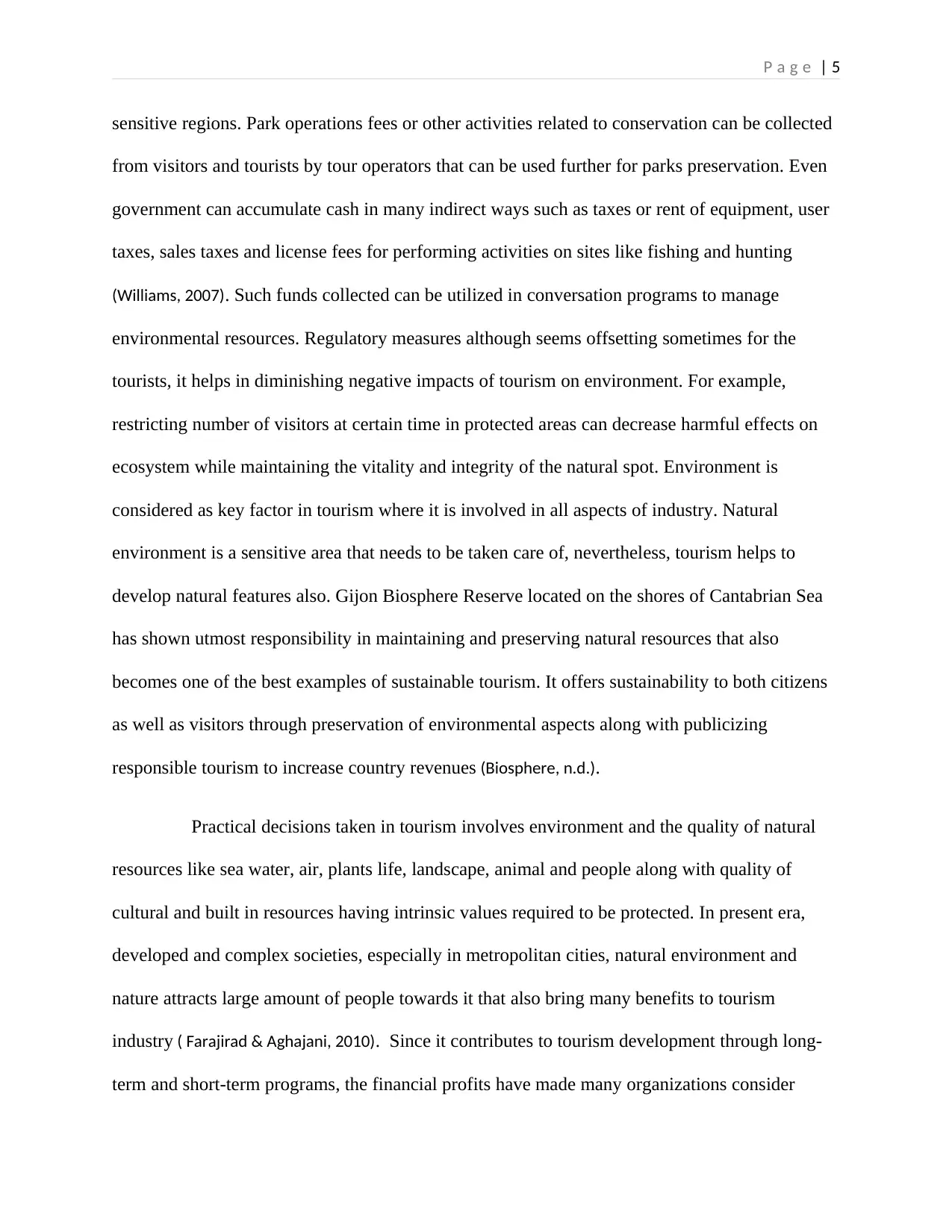
P a g e | 5
sensitive regions. Park operations fees or other activities related to conservation can be collected
from visitors and tourists by tour operators that can be used further for parks preservation. Even
government can accumulate cash in many indirect ways such as taxes or rent of equipment, user
taxes, sales taxes and license fees for performing activities on sites like fishing and hunting
(Williams, 2007). Such funds collected can be utilized in conversation programs to manage
environmental resources. Regulatory measures although seems offsetting sometimes for the
tourists, it helps in diminishing negative impacts of tourism on environment. For example,
restricting number of visitors at certain time in protected areas can decrease harmful effects on
ecosystem while maintaining the vitality and integrity of the natural spot. Environment is
considered as key factor in tourism where it is involved in all aspects of industry. Natural
environment is a sensitive area that needs to be taken care of, nevertheless, tourism helps to
develop natural features also. Gijon Biosphere Reserve located on the shores of Cantabrian Sea
has shown utmost responsibility in maintaining and preserving natural resources that also
becomes one of the best examples of sustainable tourism. It offers sustainability to both citizens
as well as visitors through preservation of environmental aspects along with publicizing
responsible tourism to increase country revenues (Biosphere, n.d.).
Practical decisions taken in tourism involves environment and the quality of natural
resources like sea water, air, plants life, landscape, animal and people along with quality of
cultural and built in resources having intrinsic values required to be protected. In present era,
developed and complex societies, especially in metropolitan cities, natural environment and
nature attracts large amount of people towards it that also bring many benefits to tourism
industry ( Farajirad & Aghajani, 2010). Since it contributes to tourism development through long-
term and short-term programs, the financial profits have made many organizations consider
sensitive regions. Park operations fees or other activities related to conservation can be collected
from visitors and tourists by tour operators that can be used further for parks preservation. Even
government can accumulate cash in many indirect ways such as taxes or rent of equipment, user
taxes, sales taxes and license fees for performing activities on sites like fishing and hunting
(Williams, 2007). Such funds collected can be utilized in conversation programs to manage
environmental resources. Regulatory measures although seems offsetting sometimes for the
tourists, it helps in diminishing negative impacts of tourism on environment. For example,
restricting number of visitors at certain time in protected areas can decrease harmful effects on
ecosystem while maintaining the vitality and integrity of the natural spot. Environment is
considered as key factor in tourism where it is involved in all aspects of industry. Natural
environment is a sensitive area that needs to be taken care of, nevertheless, tourism helps to
develop natural features also. Gijon Biosphere Reserve located on the shores of Cantabrian Sea
has shown utmost responsibility in maintaining and preserving natural resources that also
becomes one of the best examples of sustainable tourism. It offers sustainability to both citizens
as well as visitors through preservation of environmental aspects along with publicizing
responsible tourism to increase country revenues (Biosphere, n.d.).
Practical decisions taken in tourism involves environment and the quality of natural
resources like sea water, air, plants life, landscape, animal and people along with quality of
cultural and built in resources having intrinsic values required to be protected. In present era,
developed and complex societies, especially in metropolitan cities, natural environment and
nature attracts large amount of people towards it that also bring many benefits to tourism
industry ( Farajirad & Aghajani, 2010). Since it contributes to tourism development through long-
term and short-term programs, the financial profits have made many organizations consider
⊘ This is a preview!⊘
Do you want full access?
Subscribe today to unlock all pages.

Trusted by 1+ million students worldwide
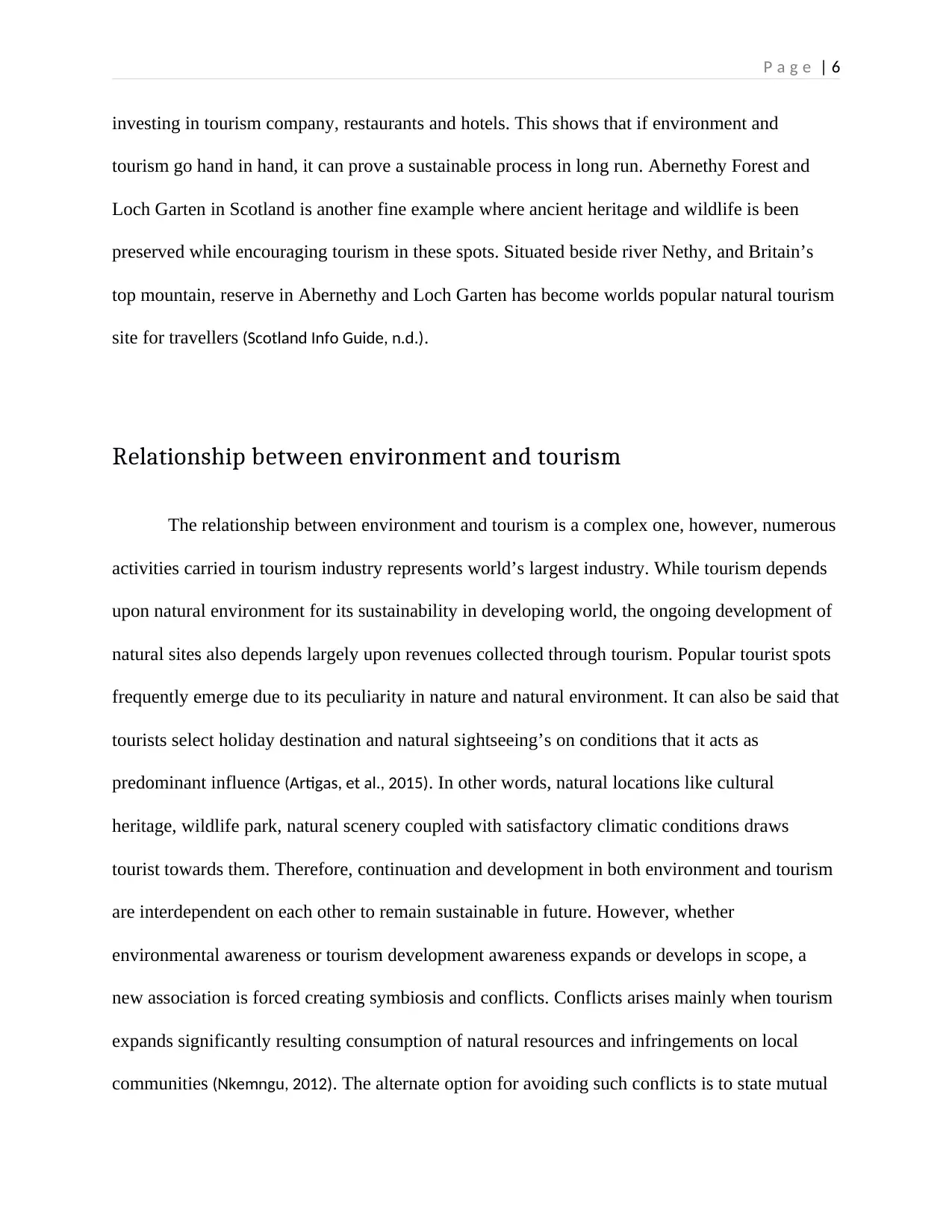
P a g e | 6
investing in tourism company, restaurants and hotels. This shows that if environment and
tourism go hand in hand, it can prove a sustainable process in long run. Abernethy Forest and
Loch Garten in Scotland is another fine example where ancient heritage and wildlife is been
preserved while encouraging tourism in these spots. Situated beside river Nethy, and Britain’s
top mountain, reserve in Abernethy and Loch Garten has become worlds popular natural tourism
site for travellers (Scotland Info Guide, n.d.).
Relationship between environment and tourism
The relationship between environment and tourism is a complex one, however, numerous
activities carried in tourism industry represents world’s largest industry. While tourism depends
upon natural environment for its sustainability in developing world, the ongoing development of
natural sites also depends largely upon revenues collected through tourism. Popular tourist spots
frequently emerge due to its peculiarity in nature and natural environment. It can also be said that
tourists select holiday destination and natural sightseeing’s on conditions that it acts as
predominant influence (Artigas, et al., 2015). In other words, natural locations like cultural
heritage, wildlife park, natural scenery coupled with satisfactory climatic conditions draws
tourist towards them. Therefore, continuation and development in both environment and tourism
are interdependent on each other to remain sustainable in future. However, whether
environmental awareness or tourism development awareness expands or develops in scope, a
new association is forced creating symbiosis and conflicts. Conflicts arises mainly when tourism
expands significantly resulting consumption of natural resources and infringements on local
communities (Nkemngu, 2012). The alternate option for avoiding such conflicts is to state mutual
investing in tourism company, restaurants and hotels. This shows that if environment and
tourism go hand in hand, it can prove a sustainable process in long run. Abernethy Forest and
Loch Garten in Scotland is another fine example where ancient heritage and wildlife is been
preserved while encouraging tourism in these spots. Situated beside river Nethy, and Britain’s
top mountain, reserve in Abernethy and Loch Garten has become worlds popular natural tourism
site for travellers (Scotland Info Guide, n.d.).
Relationship between environment and tourism
The relationship between environment and tourism is a complex one, however, numerous
activities carried in tourism industry represents world’s largest industry. While tourism depends
upon natural environment for its sustainability in developing world, the ongoing development of
natural sites also depends largely upon revenues collected through tourism. Popular tourist spots
frequently emerge due to its peculiarity in nature and natural environment. It can also be said that
tourists select holiday destination and natural sightseeing’s on conditions that it acts as
predominant influence (Artigas, et al., 2015). In other words, natural locations like cultural
heritage, wildlife park, natural scenery coupled with satisfactory climatic conditions draws
tourist towards them. Therefore, continuation and development in both environment and tourism
are interdependent on each other to remain sustainable in future. However, whether
environmental awareness or tourism development awareness expands or develops in scope, a
new association is forced creating symbiosis and conflicts. Conflicts arises mainly when tourism
expands significantly resulting consumption of natural resources and infringements on local
communities (Nkemngu, 2012). The alternate option for avoiding such conflicts is to state mutual
Paraphrase This Document
Need a fresh take? Get an instant paraphrase of this document with our AI Paraphraser
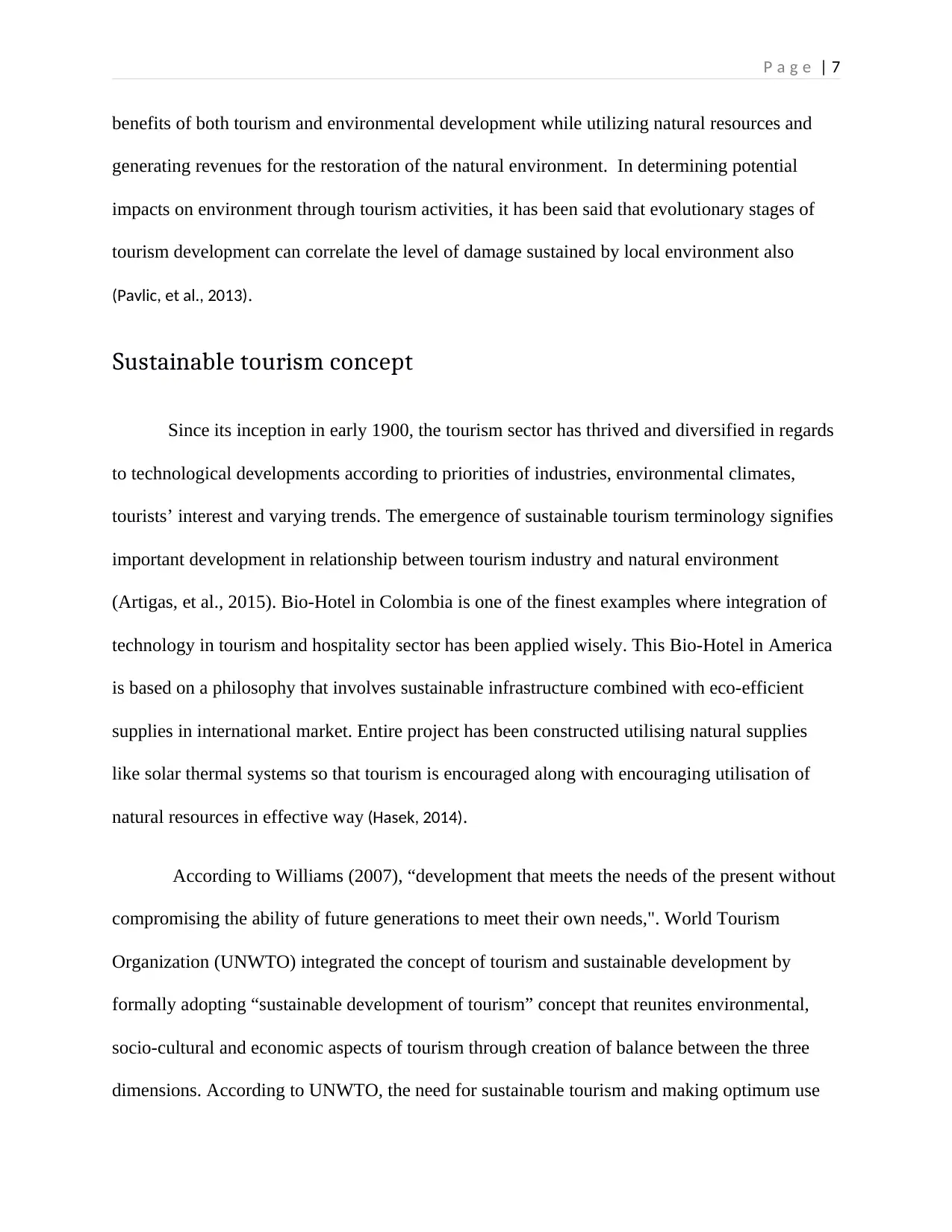
P a g e | 7
benefits of both tourism and environmental development while utilizing natural resources and
generating revenues for the restoration of the natural environment. In determining potential
impacts on environment through tourism activities, it has been said that evolutionary stages of
tourism development can correlate the level of damage sustained by local environment also
(Pavlic, et al., 2013).
Sustainable tourism concept
Since its inception in early 1900, the tourism sector has thrived and diversified in regards
to technological developments according to priorities of industries, environmental climates,
tourists’ interest and varying trends. The emergence of sustainable tourism terminology signifies
important development in relationship between tourism industry and natural environment
(Artigas, et al., 2015). Bio-Hotel in Colombia is one of the finest examples where integration of
technology in tourism and hospitality sector has been applied wisely. This Bio-Hotel in America
is based on a philosophy that involves sustainable infrastructure combined with eco-efficient
supplies in international market. Entire project has been constructed utilising natural supplies
like solar thermal systems so that tourism is encouraged along with encouraging utilisation of
natural resources in effective way (Hasek, 2014).
According to Williams (2007), “development that meets the needs of the present without
compromising the ability of future generations to meet their own needs,". World Tourism
Organization (UNWTO) integrated the concept of tourism and sustainable development by
formally adopting “sustainable development of tourism” concept that reunites environmental,
socio-cultural and economic aspects of tourism through creation of balance between the three
dimensions. According to UNWTO, the need for sustainable tourism and making optimum use
benefits of both tourism and environmental development while utilizing natural resources and
generating revenues for the restoration of the natural environment. In determining potential
impacts on environment through tourism activities, it has been said that evolutionary stages of
tourism development can correlate the level of damage sustained by local environment also
(Pavlic, et al., 2013).
Sustainable tourism concept
Since its inception in early 1900, the tourism sector has thrived and diversified in regards
to technological developments according to priorities of industries, environmental climates,
tourists’ interest and varying trends. The emergence of sustainable tourism terminology signifies
important development in relationship between tourism industry and natural environment
(Artigas, et al., 2015). Bio-Hotel in Colombia is one of the finest examples where integration of
technology in tourism and hospitality sector has been applied wisely. This Bio-Hotel in America
is based on a philosophy that involves sustainable infrastructure combined with eco-efficient
supplies in international market. Entire project has been constructed utilising natural supplies
like solar thermal systems so that tourism is encouraged along with encouraging utilisation of
natural resources in effective way (Hasek, 2014).
According to Williams (2007), “development that meets the needs of the present without
compromising the ability of future generations to meet their own needs,". World Tourism
Organization (UNWTO) integrated the concept of tourism and sustainable development by
formally adopting “sustainable development of tourism” concept that reunites environmental,
socio-cultural and economic aspects of tourism through creation of balance between the three
dimensions. According to UNWTO, the need for sustainable tourism and making optimum use
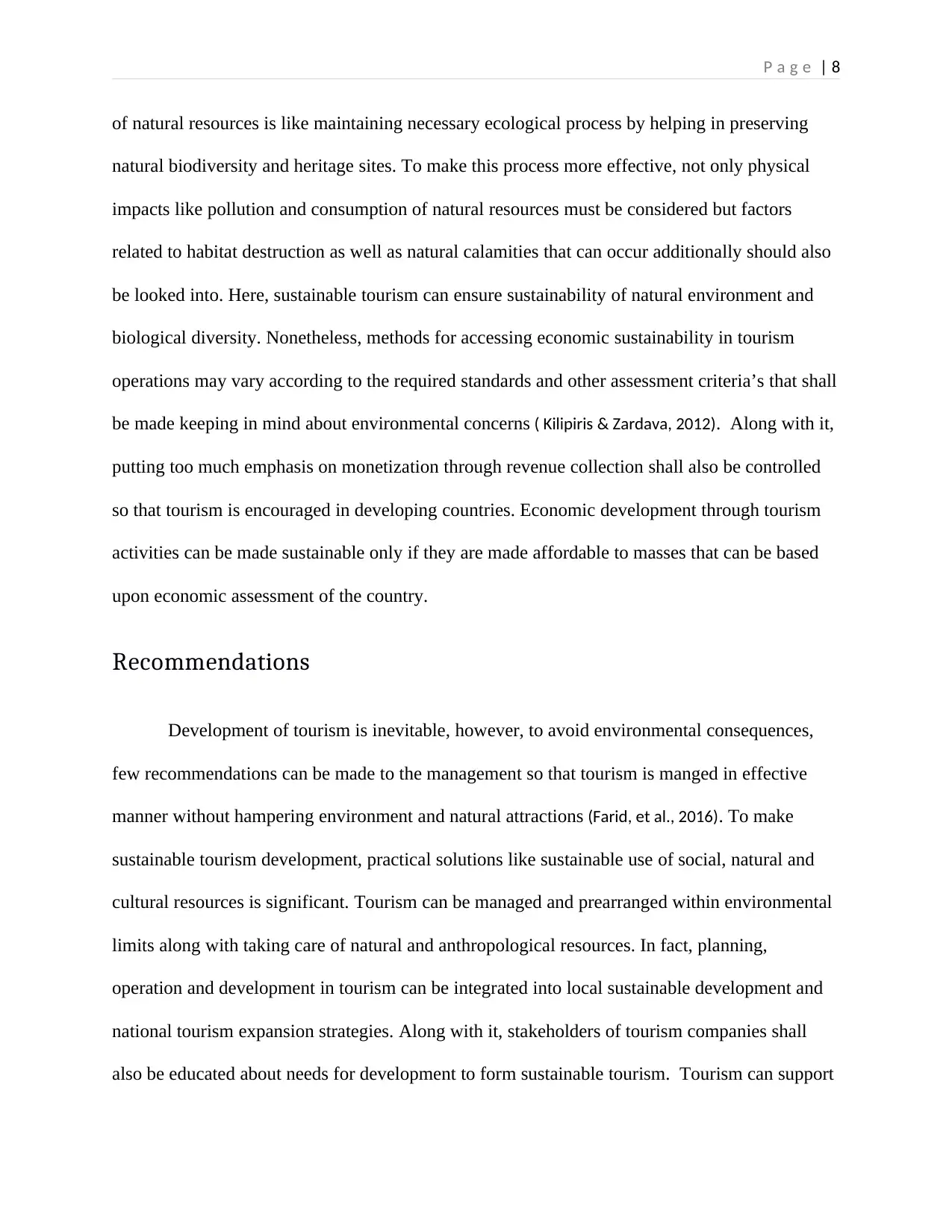
P a g e | 8
of natural resources is like maintaining necessary ecological process by helping in preserving
natural biodiversity and heritage sites. To make this process more effective, not only physical
impacts like pollution and consumption of natural resources must be considered but factors
related to habitat destruction as well as natural calamities that can occur additionally should also
be looked into. Here, sustainable tourism can ensure sustainability of natural environment and
biological diversity. Nonetheless, methods for accessing economic sustainability in tourism
operations may vary according to the required standards and other assessment criteria’s that shall
be made keeping in mind about environmental concerns ( Kilipiris & Zardava, 2012). Along with it,
putting too much emphasis on monetization through revenue collection shall also be controlled
so that tourism is encouraged in developing countries. Economic development through tourism
activities can be made sustainable only if they are made affordable to masses that can be based
upon economic assessment of the country.
Recommendations
Development of tourism is inevitable, however, to avoid environmental consequences,
few recommendations can be made to the management so that tourism is manged in effective
manner without hampering environment and natural attractions (Farid, et al., 2016). To make
sustainable tourism development, practical solutions like sustainable use of social, natural and
cultural resources is significant. Tourism can be managed and prearranged within environmental
limits along with taking care of natural and anthropological resources. In fact, planning,
operation and development in tourism can be integrated into local sustainable development and
national tourism expansion strategies. Along with it, stakeholders of tourism companies shall
also be educated about needs for development to form sustainable tourism. Tourism can support
of natural resources is like maintaining necessary ecological process by helping in preserving
natural biodiversity and heritage sites. To make this process more effective, not only physical
impacts like pollution and consumption of natural resources must be considered but factors
related to habitat destruction as well as natural calamities that can occur additionally should also
be looked into. Here, sustainable tourism can ensure sustainability of natural environment and
biological diversity. Nonetheless, methods for accessing economic sustainability in tourism
operations may vary according to the required standards and other assessment criteria’s that shall
be made keeping in mind about environmental concerns ( Kilipiris & Zardava, 2012). Along with it,
putting too much emphasis on monetization through revenue collection shall also be controlled
so that tourism is encouraged in developing countries. Economic development through tourism
activities can be made sustainable only if they are made affordable to masses that can be based
upon economic assessment of the country.
Recommendations
Development of tourism is inevitable, however, to avoid environmental consequences,
few recommendations can be made to the management so that tourism is manged in effective
manner without hampering environment and natural attractions (Farid, et al., 2016). To make
sustainable tourism development, practical solutions like sustainable use of social, natural and
cultural resources is significant. Tourism can be managed and prearranged within environmental
limits along with taking care of natural and anthropological resources. In fact, planning,
operation and development in tourism can be integrated into local sustainable development and
national tourism expansion strategies. Along with it, stakeholders of tourism companies shall
also be educated about needs for development to form sustainable tourism. Tourism can support
⊘ This is a preview!⊘
Do you want full access?
Subscribe today to unlock all pages.

Trusted by 1+ million students worldwide
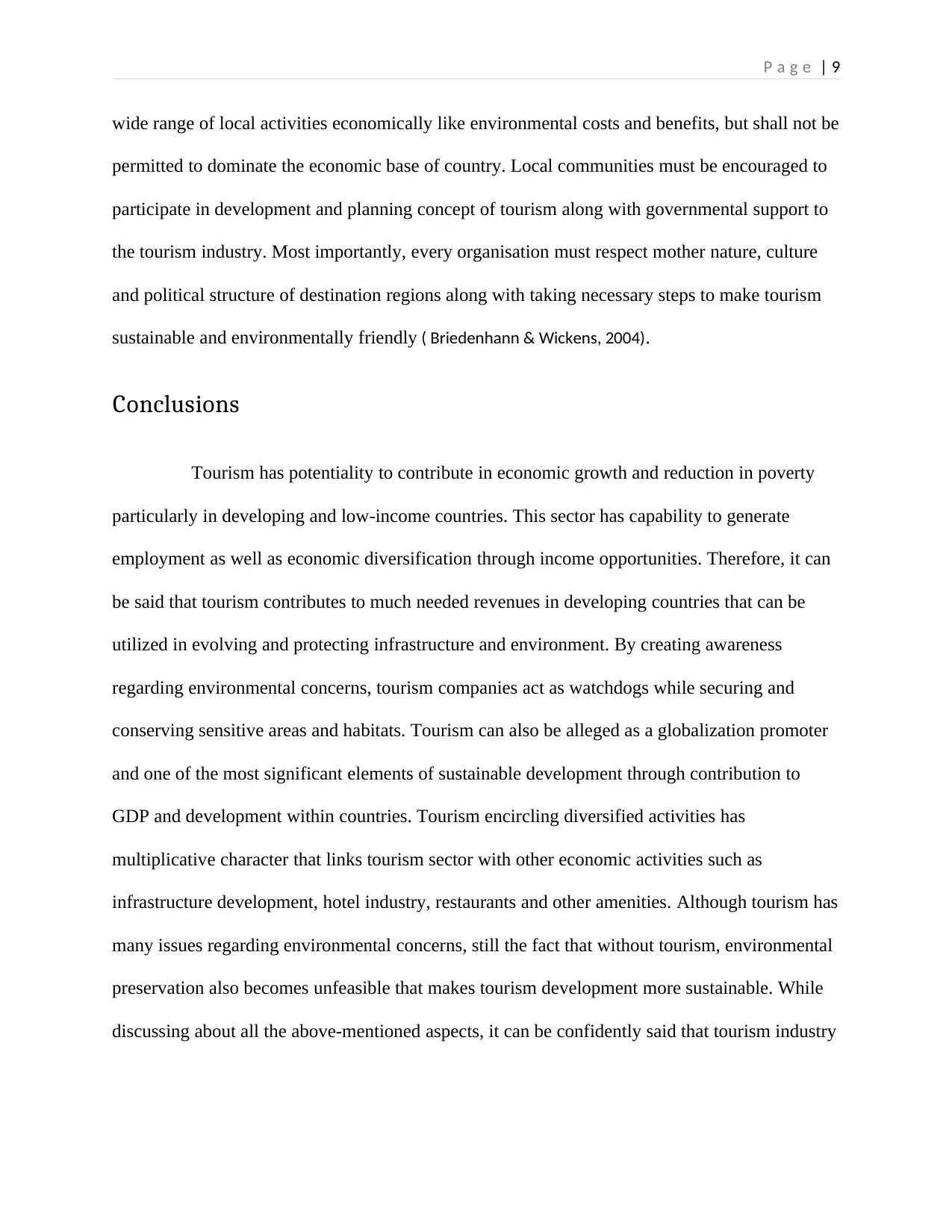
P a g e | 9
wide range of local activities economically like environmental costs and benefits, but shall not be
permitted to dominate the economic base of country. Local communities must be encouraged to
participate in development and planning concept of tourism along with governmental support to
the tourism industry. Most importantly, every organisation must respect mother nature, culture
and political structure of destination regions along with taking necessary steps to make tourism
sustainable and environmentally friendly ( Briedenhann & Wickens, 2004).
Conclusions
Tourism has potentiality to contribute in economic growth and reduction in poverty
particularly in developing and low-income countries. This sector has capability to generate
employment as well as economic diversification through income opportunities. Therefore, it can
be said that tourism contributes to much needed revenues in developing countries that can be
utilized in evolving and protecting infrastructure and environment. By creating awareness
regarding environmental concerns, tourism companies act as watchdogs while securing and
conserving sensitive areas and habitats. Tourism can also be alleged as a globalization promoter
and one of the most significant elements of sustainable development through contribution to
GDP and development within countries. Tourism encircling diversified activities has
multiplicative character that links tourism sector with other economic activities such as
infrastructure development, hotel industry, restaurants and other amenities. Although tourism has
many issues regarding environmental concerns, still the fact that without tourism, environmental
preservation also becomes unfeasible that makes tourism development more sustainable. While
discussing about all the above-mentioned aspects, it can be confidently said that tourism industry
wide range of local activities economically like environmental costs and benefits, but shall not be
permitted to dominate the economic base of country. Local communities must be encouraged to
participate in development and planning concept of tourism along with governmental support to
the tourism industry. Most importantly, every organisation must respect mother nature, culture
and political structure of destination regions along with taking necessary steps to make tourism
sustainable and environmentally friendly ( Briedenhann & Wickens, 2004).
Conclusions
Tourism has potentiality to contribute in economic growth and reduction in poverty
particularly in developing and low-income countries. This sector has capability to generate
employment as well as economic diversification through income opportunities. Therefore, it can
be said that tourism contributes to much needed revenues in developing countries that can be
utilized in evolving and protecting infrastructure and environment. By creating awareness
regarding environmental concerns, tourism companies act as watchdogs while securing and
conserving sensitive areas and habitats. Tourism can also be alleged as a globalization promoter
and one of the most significant elements of sustainable development through contribution to
GDP and development within countries. Tourism encircling diversified activities has
multiplicative character that links tourism sector with other economic activities such as
infrastructure development, hotel industry, restaurants and other amenities. Although tourism has
many issues regarding environmental concerns, still the fact that without tourism, environmental
preservation also becomes unfeasible that makes tourism development more sustainable. While
discussing about all the above-mentioned aspects, it can be confidently said that tourism industry
Paraphrase This Document
Need a fresh take? Get an instant paraphrase of this document with our AI Paraphraser

P a g e | 10
is sustainable part of modern civilization that involves entire society in its activities thus making
the world one united place.
is sustainable part of modern civilization that involves entire society in its activities thus making
the world one united place.
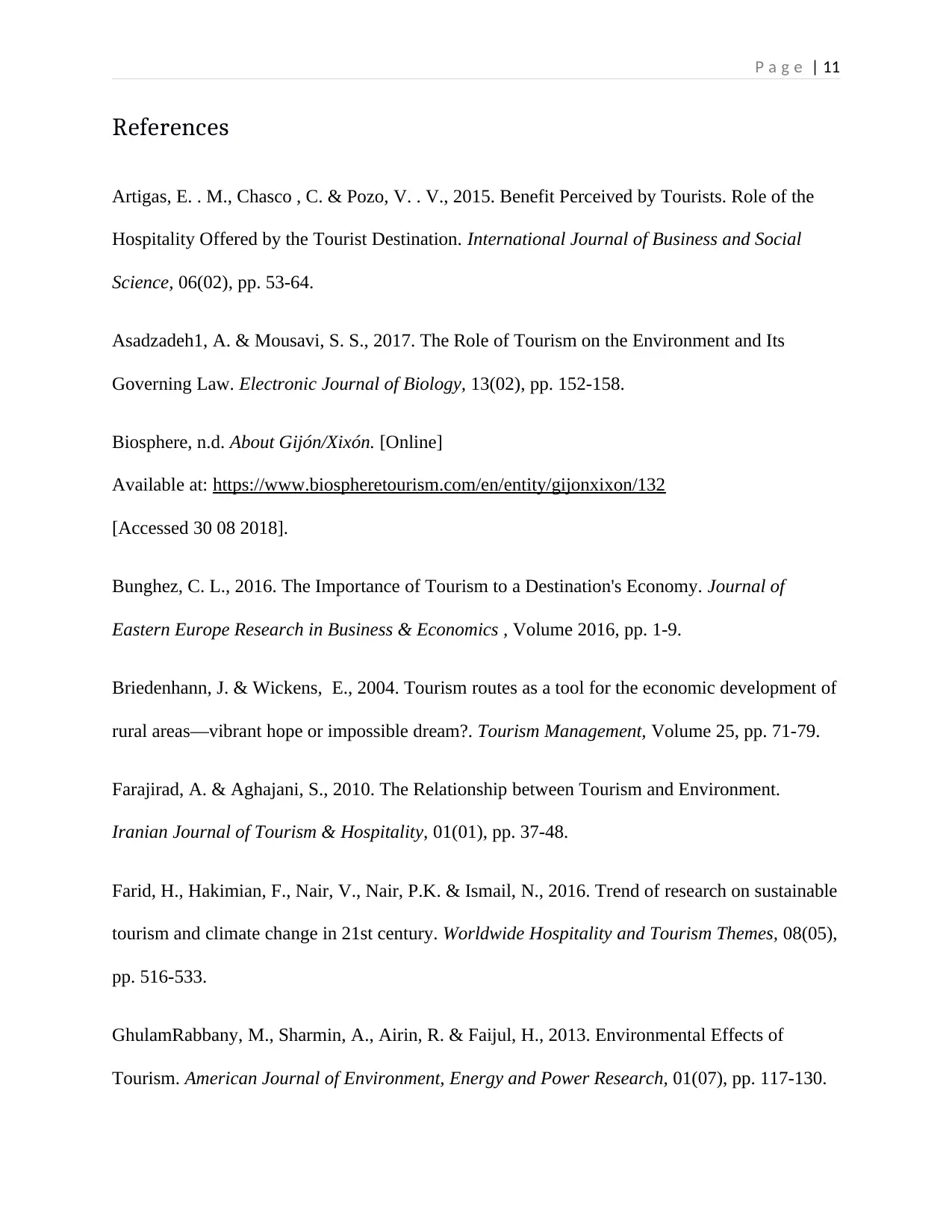
P a g e | 11
References
Artigas, E. . M., Chasco , C. & Pozo, V. . V., 2015. Benefit Perceived by Tourists. Role of the
Hospitality Offered by the Tourist Destination. International Journal of Business and Social
Science, 06(02), pp. 53-64.
Asadzadeh1, A. & Mousavi, S. S., 2017. The Role of Tourism on the Environment and Its
Governing Law. Electronic Journal of Biology, 13(02), pp. 152-158.
Biosphere, n.d. About Gijón/Xixón. [Online]
Available at: https://www.biospheretourism.com/en/entity/gijonxixon/132
[Accessed 30 08 2018].
Bunghez, C. L., 2016. The Importance of Tourism to a Destination's Economy. Journal of
Eastern Europe Research in Business & Economics , Volume 2016, pp. 1-9.
Briedenhann, J. & Wickens, E., 2004. Tourism routes as a tool for the economic development of
rural areas—vibrant hope or impossible dream?. Tourism Management, Volume 25, pp. 71-79.
Farajirad, A. & Aghajani, S., 2010. The Relationship between Tourism and Environment.
Iranian Journal of Tourism & Hospitality, 01(01), pp. 37-48.
Farid, H., Hakimian, F., Nair, V., Nair, P.K. & Ismail, N., 2016. Trend of research on sustainable
tourism and climate change in 21st century. Worldwide Hospitality and Tourism Themes, 08(05),
pp. 516-533.
GhulamRabbany, M., Sharmin, A., Airin, R. & Faijul, H., 2013. Environmental Effects of
Tourism. American Journal of Environment, Energy and Power Research, 01(07), pp. 117-130.
References
Artigas, E. . M., Chasco , C. & Pozo, V. . V., 2015. Benefit Perceived by Tourists. Role of the
Hospitality Offered by the Tourist Destination. International Journal of Business and Social
Science, 06(02), pp. 53-64.
Asadzadeh1, A. & Mousavi, S. S., 2017. The Role of Tourism on the Environment and Its
Governing Law. Electronic Journal of Biology, 13(02), pp. 152-158.
Biosphere, n.d. About Gijón/Xixón. [Online]
Available at: https://www.biospheretourism.com/en/entity/gijonxixon/132
[Accessed 30 08 2018].
Bunghez, C. L., 2016. The Importance of Tourism to a Destination's Economy. Journal of
Eastern Europe Research in Business & Economics , Volume 2016, pp. 1-9.
Briedenhann, J. & Wickens, E., 2004. Tourism routes as a tool for the economic development of
rural areas—vibrant hope or impossible dream?. Tourism Management, Volume 25, pp. 71-79.
Farajirad, A. & Aghajani, S., 2010. The Relationship between Tourism and Environment.
Iranian Journal of Tourism & Hospitality, 01(01), pp. 37-48.
Farid, H., Hakimian, F., Nair, V., Nair, P.K. & Ismail, N., 2016. Trend of research on sustainable
tourism and climate change in 21st century. Worldwide Hospitality and Tourism Themes, 08(05),
pp. 516-533.
GhulamRabbany, M., Sharmin, A., Airin, R. & Faijul, H., 2013. Environmental Effects of
Tourism. American Journal of Environment, Energy and Power Research, 01(07), pp. 117-130.
⊘ This is a preview!⊘
Do you want full access?
Subscribe today to unlock all pages.

Trusted by 1+ million students worldwide
1 out of 13
Related Documents
Your All-in-One AI-Powered Toolkit for Academic Success.
+13062052269
info@desklib.com
Available 24*7 on WhatsApp / Email
![[object Object]](/_next/static/media/star-bottom.7253800d.svg)
Unlock your academic potential
Copyright © 2020–2026 A2Z Services. All Rights Reserved. Developed and managed by ZUCOL.



